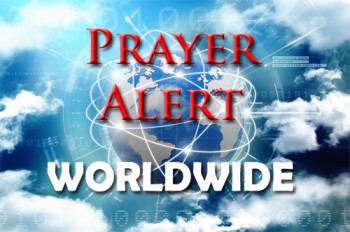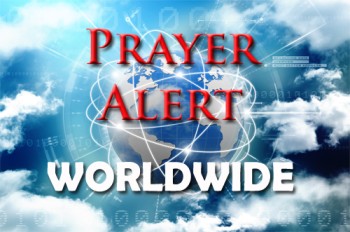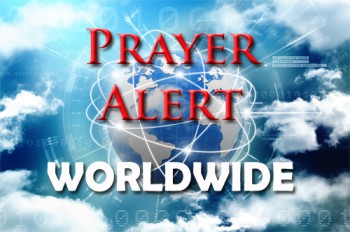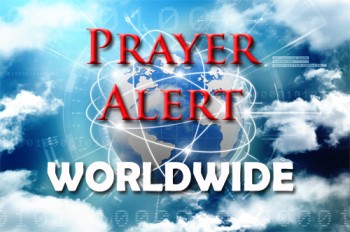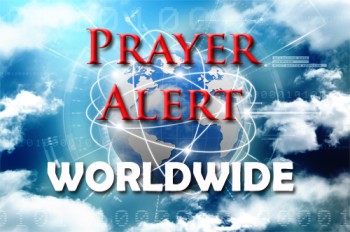Displaying items by tag: Asia
India: Diwali - pray for Hindus
With over one billion people, Hinduism is the third largest religion in the world. The majority of Hindus have never heard the name of Jesus, and less than 2% of Protestant missionaries are serving among them. Centred mostly in India, Hinduism is much more than a religion; it is a way of life and a cultural identity. Acts of violence and intimidation by militant Hindus are on the rise, particularly against Christians. The five-day festival of Diwali, also called Festival of Lights, began on 4 November. Diwali can often also be celebrated by Jains, Sikhs and some Newar Buddhists. Few Indian festivals are as popular or anticipated, or as widely celebrated worldwide as Diwali. Diwali symbolises a spiritual ‘victory of light over darkness, good over evil, and knowledge over ignorance’. Despite the candles and fireworks, these millions of people remain in darkness.
China: government closes Christian school
Over 100 students lost their opportunity to continue their education at Jinweizi Christian School founded by Golden Lamp Stand Christian Church. The school mainly served Christian families escaping government-mandated public school. Because of its loving environment many children with autism and other special needs also attended. These children were discriminated against and rejected by public schools. Jinweizi operated for many years with a wide range of grades, from kindergarten to secondary, with comprehensive educational facilities and equipment for over 100 students. Communist party officials confiscated the school’s expensive equipment and effectively stripped the students of any opportunity to continue their education. Private schools in China do not have a traditional campus. Students meet in any available space: apartments, office spaces, or any available venues. Teachers and faculty rent properties until the government intervenes. Many Christian schools are considered ‘illegal’ because they are separate from the communist-controlled public schools.
Israel: a nail in the peace coffin
Joe Biden plans to open a consulate in Jerusalem. This amounts to an actual US embassy to the Palestinians on Israeli territory. Many believe its true purpose is to undermine Israeli sovereignty in its own capital city. It will also jeopardise future prospects for peace between Israel and Palestinian Arabs. As well as betraying Israel, Biden's diplomatic signalling also appeases his hard-left supporters and is a betrayal of the Palestinian people. They have suffered too long and too hard under the hostility of their leadership, which has consistently refused to entertain all proposals for peace with Israel that could lead to the establishment of their own state. Successive Palestinian leaders have been encouraged in their inflexibility by the US and Europe, who have for decades extracted concession after concession from Israel while Palestinians make none. The intended consulate in Israel's capital will encourage greater support for Hamas, currently ruling Gaza.
Afghanistan: Taliban control - weekly bombings
A large explosion, claimed by IS, tore through a Shi’ite mosque in Kandahar during Friday prayers, killing at least 47 people. That bombing was the third in twelve days, and the deadliest since US forces left in August. It is also the first major IS attack in southern Afghanistan, raising concerns that the group is expanding its reach. Voice of the Martyrs (VOM) says Islamic militant groups do not always support each other; they are all seeking power. US and allied forces withdrew and created a power vacuum that the Taliban want to fill. However, IS wants to take control and plays on the fears of people by creating instability through terrorist attacks. Afghanistan will be unstable as long as there is a power struggle. VOM believes religious freedom underpins all other freedoms. Pray for religious freedom and for the churches to grow and be salt and light.
Afghanistan: Taliban control - extreme poverty and starvation
Afghanistan is facing the biggest humanitarian crisis in the world. International funds which propped up the country’s fragile economy have stopped as the world debates how to deal with the Taliban. The UN has issued a stark warning - millions will die if urgent aid does not reach Afghanistan soon. A BBC video revealed a family forced to sell their baby to feed the rest of the family and other dire situations. 22.8 million people facing acute food insecurity. 3.2 million children under five could suffer acute malnutrition. The Taliban takeover weakened a fragile economy heavily dependent on foreign aid. Western powers, the World Bank, and the International Monetary Fund have suspended aid on this aid-dependent nation.
China: Early Rain Church face ongoing harassment
On 26 October unknown people vandalised the door of preacher Dai Zhichao, filled the keyhole with glue, and cut off the electricity. Another church leader and his family were detained for over ten hours. Other members of Early Rain Church have faced mounting persecution. Officials shut off power and water to one preacher’s house for nine months. Keyholes to Christian homes are filled with glue. People are so harassed they have to move. One moved five times in two years. On 18 October police summoned a brother to the police station on a charge of ‘organising an evil cult’. In spite of harsh persecution, Early Rain has continued to speak for the persecuted, pray for people, and encourage other house churches to stand firm and walk the way of the cross. They ask fellow believers to pray that God helps and allows them to live in Chengdu in peace.
Burma (Myanmar): ‘we work with tears’
A third Covid wave hit Myanmar amid ongoing violence from February’s coup. A ministry leader said, ‘This morning the wife of one of our workers cried on the phone, “My husband is struggling for breath. We need oxygen.” I asked our driver to go as soon as possible for a two-hour drive. The military frequently stop vehicles and confiscate oxygen tanks and medicines. Local missionaries drive for eight to ten hours to provide life-saving medical equipment and food aid. These days are mourning and weeping days. We are fighting the seen enemy, the military coup, and the unseen enemy, Covid. Many die by guns, bombs and Covid. Much violence is random. A pastor’s wife was killed in their house, a woman was killed while riding a motorbike toward the hospital. Since we have no government, no hospital, no government doctors and nurses, we search for private doctors and nurses that are available.’
Iran: Bible reading plan
Iranians across the world have joined a Bible reading plan organised by the Bible Society. Nahid, a Christian worker, says it is a great way for these Christians to connect with each other. If they think they are alone, they can get depressed, but when they are reading scripture with another sister or brother, it is healing. This Bible reading plan has been especially helpful during the pandemic. Iranian Christians love Jesus with all their hearts, and seek to show His love to the world. But some in the West are still not ready to see them as Christians.
Syria: poverty, but God is working
After a decade of civil war, Syria has at last begun to reconnect with its neighbouring countries, including Lebanon, Jordan, and the UAE. President Assad’s grip on the country is tenuous as areas near the Turkish and Iraqi borders are controlled by rebel groups. Fighting has left Syria in economic ruins; families which used to have more than enough income to provide for themselves are now in poverty because of hyperinflation. A man with cancer did not continue with expensive treatment; it was better that one dies rather than all of them dying. Families without enough food for all their children give lunch to some children lunch and dinner to the others. But God is working. The story of Jesus is reaching new populations; there is a budding movement of the Holy Spirit and churches are forming among the Druze in the south and the Kurds in the north.
Sri Lanka: Indian fish poaching
On 17 October Sri Lankan fishermen launched a flotilla of boats from the northeastern fishing town of Mullaittivu to Sri Lanka’s northernmost tip, Point Pedro away. They are demanding that the government does more to protect the nation's prawn-rich northern waters from poaching by Indian fishing trawlers in the narrow Palk Strait which separates the South Asian neighbours. Bottom trawling was banned from Sri Lankan waters in 2017 because it involves dragging heavy nets across the seafloor to catch a large volume of fish, causing severe damage to the marine ecosystem. However, the authorities have failed to stop Indian poaching even though their fishing community has been complaining for years. Mass poaching takes valuable fish stocks away from Sri Lankan fishermen, so they struggle to make ends meet. Palk Strait is a rich fishing ground known for jumbo prawns. Sri Lanka regularly detains large numbers of Indian fishers and seizes their boats, but poaching continues.
